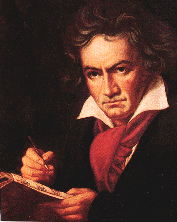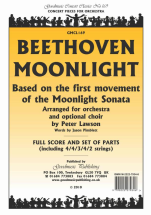Moonlight, based upon the Moonlight Sonata, first movement
Buy this item (out of stock)
Product ID: GM1 CL169
By Ludwig Van Beethoven
published: 1801
Publisher:
Goodmusic
Arranger:
Lawson
Series:
Concert Classics
Genre:
Romantic Era
Line Up:
Symphony Orchestra (Solo: Choir Opt.)
Duration:
5:30
Level: 4
Set & Score
This item is out of stock
About this item
Here is Beethoven's most famous piano piece, the first movement of his Moonlight Sonata, in an arrangement for concert orchestra. Not only can it be played by concert orchestra alone but also this arrangement can be used to accompany a choir with a soprano, mezzo-soprano or tenor soloist. The choir can be either a mixed voice choir (SATB), a choir of upper voices (SSA) or a male voice choir (TTBB). One copy of each choir version is included in the pack of parts and additional copies are on sale. The choir versions can also be performed with only a piano accompaniment - just in case all the orchestra wanted to stay in the pub!
The lyrics have been written specially by Jason Pimblett.
Instrumentation
2 Flutes, 2 Oboes, 2 Clarinets in Bb or A, 2 Bassoons 2 Horns in F, 2 Trumpets in Bb, 3 Trombones, Tuba, Timpani, Percussion (2 players:Tubular bells, Glockenspiel, Vibraphone, Tam-tam, Bass Drum), Harp or Keyboard Strings (Violin 1, Violin 2, Viola,
Reviews and rating
No review available, be the first to write one!

Composer
Ludwig Van Beethoven (1770-1827)

Ludwig van Beethoven (baptized 17 December 1770 – 26 March 1827) was a German composer and pianist. The crucial figure in the transition between the Classical and Romantic eras in Western art music, he remains one of the most famous and influential composers of all time.
Born in Bonn, then the capital of the Electorate of Cologne and part of the Holy Roman Empire, Beethoven moved to Vienna in his early 20s, studying with Joseph Haydn and quickly gaining a reputation as a virtuoso pianist. His hearing began to deteriorate in the late 1790s, yet he continued to compose, conduct, and perform, even after becoming completely deaf.
More info about the composer...



 Click above to view samples
Click above to view samples
